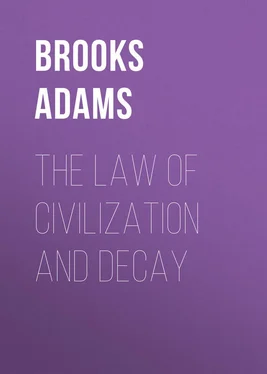Brooks Adams - The Law of Civilization and Decay
Здесь есть возможность читать онлайн «Brooks Adams - The Law of Civilization and Decay» — ознакомительный отрывок электронной книги совершенно бесплатно, а после прочтения отрывка купить полную версию. В некоторых случаях можно слушать аудио, скачать через торрент в формате fb2 и присутствует краткое содержание. Жанр: foreign_antique, foreign_prose, на английском языке. Описание произведения, (предисловие) а так же отзывы посетителей доступны на портале библиотеки ЛибКат.
- Название:The Law of Civilization and Decay
- Автор:
- Жанр:
- Год:неизвестен
- ISBN:нет данных
- Рейтинг книги:4 / 5. Голосов: 1
-
Избранное:Добавить в избранное
- Отзывы:
-
Ваша оценка:
- 80
- 1
- 2
- 3
- 4
- 5
The Law of Civilization and Decay: краткое содержание, описание и аннотация
Предлагаем к чтению аннотацию, описание, краткое содержание или предисловие (зависит от того, что написал сам автор книги «The Law of Civilization and Decay»). Если вы не нашли необходимую информацию о книге — напишите в комментариях, мы постараемся отыскать её.
The Law of Civilization and Decay — читать онлайн ознакомительный отрывок
Ниже представлен текст книги, разбитый по страницам. Система сохранения места последней прочитанной страницы, позволяет с удобством читать онлайн бесплатно книгу «The Law of Civilization and Decay», без необходимости каждый раз заново искать на чём Вы остановились. Поставьте закладку, и сможете в любой момент перейти на страницу, на которой закончили чтение.
Интервал:
Закладка:
When surplus energy has accumulated in such bulk as to preponderate over productive energy, it becomes the controlling social force. Thenceforward, capital is autocratic, and energy vents itself through those organisms best fitted to give expression to the power of capital. In this last stage of consolidation, the economic, and, perhaps, the scientific intellect is propagated, while the imagination fades, and the emotional, the martial, and the artistic types of manhood decay. When a social velocity has been attained at which the waste of energetic material is so great that the martial and imaginative stocks fail to reproduce themselves, intensifying competition appears to generate two extreme economic types, – the usurer in his most formidable aspect, and the peasant whose nervous system is best adapted to thrive on scanty nutriment. At length a point must be reached when pressure can go no further, and then, perhaps, one of two results may follow: A stationary period may supervene, which may last until ended by war, by exhaustion, or by both combined, as seems to have been the case with the Eastern Empire; or, as in the Western, disintegration may set in, the civilized population may perish, and a reversion may take place to a primitive form of organism.
The evidence, however, seems to point to the conclusion that, when a highly centralized society disintegrates, under the pressure of economic competition, it is because the energy of the race has been exhausted. Consequently, the survivors of such a community lack the power necessary for renewed concentration, and must probably remain inert until supplied with fresh energetic material by the infusion of barbarian blood.
BROOKS ADAMS.Quincy, August 20, 1896.
CHAPTER I
THE ROMANS
When the Romans first emerged from the mist of fable, they were already a race of land-owners who held their property in severalty, and, as the right of alienation was established, the formation of relatively large estates had begun. The ordinary family, however, held, perhaps, twelve acres, and, as the land was arable, and the staple grain, it supported a dense rural population. The husbandmen who tilled this land were of the martial type, and, probably for that reason, though supremely gifted as administrators and soldiers, were ill-fitted to endure the strain of the unrestricted economic competition of a centralized society. Consequently their conquests had hardly consolidated before decay set in, a decay whose causes may be traced back until they are lost in the dawn of history.
The Latins had little economic versatility; they lacked the instinct of the Greeks for commerce, or of the Syrians and Hindoos for manufactures. They were essentially land-owners, and, when endowed with the acquisitive faculty, usurers. The latter early developed into a distinct species, at once more subtle of intellect and more tenacious of life than the farmers, and on the disparity between these two types of men, the fate of all subsequent civilization has hinged. At a remote antiquity Roman society divided into creditors and debtors; as it consolidated, the power of the former increased, thus intensifying the pressure on the weak, until, when centralization culminated under the Cæsars, reproduction slackened, disintegration set in, and, after some centuries of decline, the Middle Ages began.
The history of the monarchy must probably always remain a matter of conjecture, but it seems reasonably certain that the expulsion of the Tarquins was the victory of an hereditary monied caste, which succeeded in concentrating the functions of government in a practically self-perpetuating body drawn from their own order. 1 1 History of Rome , Mommsen, Dickson’s trans., i. 288, 290.
Niebuhr has demonstrated, in one of his most striking chapters, that usury was originally a patrician privilege; and some of the fiercest struggles of the early republic seem to have been decided against the oligarchy by wealthy plebeians, who were determined to break down the monopoly in money-lending. At all events, the conditions of life evidently favoured the growth of the instinct which causes its possessor to suck the vitality of the economically weak; and Macaulay, in the preface to Virginia , has given so vivid a picture of the dominant class, that one passage at least should be read entire.
“The ruling class in Rome was a monied class; and it made and administered the laws with a view solely to its own interest. Thus the relation between lender and borrower was mixed up with the relation between sovereign and subject. The great men held a large portion of the community in dependence by means of advances at enormous usury. The law of debt, framed by creditors, and for the protection of creditors, was the most horrible that has ever been known among men. The liberty, and even the life, of the insolvent were at the mercy of the patrician money-lenders. Children often became slaves in consequence of the misfortunes of their parents. The debtor was imprisoned, not in a public gaol under the care of impartial public functionaries, but in a private workhouse belonging to the creditor. Frightful stories were told respecting these dungeons.”
But a prisoner is an expense, and the patricians wanted money. Their problem was to exhaust the productive power of the debtor before selling him, and, as slaves have less energy than freemen, a system was devised by which the plebeians were left on their land, and stimulated to labour by the hope of redeeming themselves and their children from servitude. Niebuhr has explained at length how this was done.
For money weighed out a person could pledge himself, his family, and all that belonged to him. In this condition he became nexus , and remained in possession of his property until breach of condition, when the creditor could proceed by summary process. 2 2 History of Rome , Niebuhr, Hare’s trans., i. 576. Niebuhr has been followed in the text, although the “nexum” is one of the vexed points of Roman law. (See Über das altrömische Schuldrecht , Savigny.) The precise form of the contract is, however, perhaps, not very important for the matter in hand, as most scholars seem agreed that it resembled a mortgage, the breach of whose condition involved not only the loss of the pledge, but the personal liberty of the debtor. See Gaius , iv. 21.
Such a contract satisfied the requirements, and the usurers had then only to invent a judgment for debt severe enough to force the debtor to become nexus when the alternative was offered him. This presented no difficulty. When an action was begun the defendant had thirty days of grace, and was then arrested and brought before the prætor. If he could neither pay nor find security, he was fettered with irons weighing not less than fifteen pounds, and taken home by the plaintiff. There he was allowed a pound of corn a day, and given sixty days in which to settle. If he failed, he was taken again before the prætor and sentenced. Under this sentence he might be sold or executed, and, where there were several plaintiffs, they might cut him up among them, nor was any individual liable for carving more than his share. 3 3 History of Rome , Niebuhr, Hare’s trans., ii. 599. But compare Aulus Gellius , xx. 1.
A man so sentenced involved his descendants, and therefore, rather than submit, the whole debtor class became nexi , toiling for ever to fulfil contracts quite beyond their strength, and year by year sinking more hopelessly into debt, for ordinarily the accumulated interest soon raised “the principal to many times its original amount.” 4 4 Ibid. , i. 582.
Niebuhr has thus summed up the economic situation: —
“To understand the condition of the plebeian debtors, let the reader, if he is a man of business, imagine that the whole of the private debts in a given country were turned into bills at a year, bearing interest at twenty per cent or more; and that the non-payment of them were followed on summary process by imprisonment, and by the transfer of the debtor’s whole property to his creditor, even though it exceeded what he owed. We do not need those further circumstances, which are incompatible with our manners, the personal slavery of the debtor and of his children, to form an estimate of the fearful condition of the unfortunate plebeians.” 5 5 History of Rome , Niebuhr, Hare’s trans., i. 583.
Интервал:
Закладка:
Похожие книги на «The Law of Civilization and Decay»
Представляем Вашему вниманию похожие книги на «The Law of Civilization and Decay» списком для выбора. Мы отобрали схожую по названию и смыслу литературу в надежде предоставить читателям больше вариантов отыскать новые, интересные, ещё непрочитанные произведения.
Обсуждение, отзывы о книге «The Law of Civilization and Decay» и просто собственные мнения читателей. Оставьте ваши комментарии, напишите, что Вы думаете о произведении, его смысле или главных героях. Укажите что конкретно понравилось, а что нет, и почему Вы так считаете.












